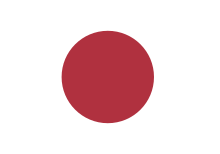| Japan at the 1994 Winter Paralympics | |
|---|---|
 | |
| IPC code | JPN |
| NPC | Japan Paralympic Committee |
| Website | www |
| in Lillehammer | |
| Competitors | 26 |
| Medals Ranked 18th |
|
| Winter Paralympics appearances (overview) | |
Japan competed at the 1994 Winter Paralympics in Lillehammer, Norway. 26 competitors from Japan won 6 medals, 3 silver and 3 bronze, and finished 18th in the medal table. [1]